Information »Always North«
Vicki Jarrett: »Always North« (short story) Vicki Jarrett: »Always North« (novel, Unsung Stories, 2019) Information (English & German) Translated by Anna Galt
Vicki Jarrett: »Always North« (short story)
Vicki Jarrett: »Always North« (novel, Unsung Stories, 2019)
Information (English & German)
Translated by Anna Galt
- No tags were found...
Create successful ePaper yourself
Turn your PDF publications into a flip-book with our unique Google optimized e-Paper software.
Vicki Jarrett: <strong>»Always</strong> <strong>North«</strong><br />
<strong>Information</strong> (English & German)<br />
Vicki Jarrett is a novelist and short story writer from Edinburgh.<br />
Her first novel Nothing is Heavy (Linen Press, 2012) was shortlisted<br />
for the Saltire Society Scottish First Book of the Year<br />
2013. Her collection of short stories, The Way Out, published<br />
in 2015 (Freight Books), was longlisted for the Frank O’Connor<br />
International Short Story Award, and shortlisted for the<br />
Jerwood FictionUncovered Prize and the Edge Hill Short Story<br />
Prize. Her latest novel, Always North, which moves into more<br />
speculative territory than her previous work, came out at the<br />
end of 2019 from Unsung Stories and was shortlisted for the<br />
Red Tentacle (Novel) Award in the Kitschies 2019. All informations<br />
about her work are available under www.vickijarrett.com.
Vicki Jarrett’s <strong>»Always</strong> <strong>North«</strong> finds a strong metaphor for the eeriness of the rapidly<br />
changing climate and for the destructive power of humans. The short story works with<br />
elements of thriller and mystery and thereby achieves a lot of suspense.<br />
The short story tells the tale of a ship’s expedition into an endless sea of ice and a mysterious<br />
encounter between the crew and a polar bear. As the ship pushes on further and further into the<br />
ice, mysterious incidents start to happen more frequently. Dead bodies of animals, skinned and<br />
headless, probably seals, suddenly appear on board. There are technical problems, the ship’s<br />
machines have lost their temporal coding, it seems time can no longer be measured the way it<br />
usually is. Suddenly a huge polar bear manages to get on board. All the food has disappeared<br />
from the galley. The crew is faced with death, either being killed by the polar bear or starving<br />
to death. But the bear doesn’t attack. He sees allies in the sailors, hunters, who like him, want<br />
to hunt seals. It turns out: the skinned seals were an offering to the crew. A strange alliance is<br />
formed between bear and human, in which the crew becomes more and more like the bear.<br />
Vicky Jarrett then developed the short story into a novel <strong>»Always</strong> <strong>North«</strong> (Unsung Stories, 2019).<br />
The first part of the novel consists of log entries by a software engineer, Isobel, who is part of<br />
an expedition into the polar ice in the arctic summer of 2025 with her partner Grant, in order<br />
to search for undiscovered oil fields there for her company. Izzy is a young and restless woman,<br />
with a variable sense of morality, who excuses her participation in the semi-legal expedition into<br />
the protected arctic wilderness by saying that someone else would just take her place it if she<br />
weren’t doing it. But the expedition seems to be ill-fated. Even before they leave, the company<br />
receives a visit from a group of climate activists, who confront them about their shady business<br />
and the damage that an expedition like this might cause to the polar bears’ environment.<br />
Despite all the objections, the Polar Horizon sets out to sea, following the channel made by a<br />
nuclear powered ice-breaker in the dangerous polar region.<br />
In the middle of the ice, the crew encounter a mysterious polar bear, who is supposedly responsible<br />
for the death of the captain’s brother 20 years before. Inexplicably, the bear is still alive,<br />
apparently defying the laws of nature. When there’s a problem with a sonobuoy, Isobel and some<br />
of the other crew members are forced to leave the ship and, by doing so, come closer to the polar<br />
bear. They barely manage to escape its claws. Shortly afterwards, the ice-breaker disappears,
things start to go wrong on board. The system collapses: in the middle of the chaos, the bear<br />
manages to get on board and attacks.<br />
20 years have passed since the catastrophe on board the Polar Horizon and in 2045 the world is<br />
no longer the same. After the crew returned from their expedition, society collapsed into chaos.<br />
The consequences of climate change occurred more rapidly than expected and within a few<br />
years, rising seas had destroyed the coastal regions and displaced millions of people, who fled<br />
inland. In Scotland, where Isobel now lives in the provisional city of Avie, living conditions are<br />
more than precarious. There’s no work, many people die of starvation and criminal gangs and<br />
looters roam the streets day after day. An intact society now only exists in the reality shows of<br />
the past, which are constantly rerun on TV. Politicians are powerless and have barricaded themselves<br />
in their villas in the mountains. Isobel too has nothing. Then she meets her long-forgotten<br />
colleague Grant again. He offers her a job and wants to disclose the secret about the expedition,<br />
the chain reaction it caused and how they might have contributed to it. Despite having some<br />
inner misgivings, Isobel agrees to accept the job at the ominous scientific institute Northolt.<br />
Using her log entries and through the power of memory, they want to break through time and<br />
space and recreate the past. The experiments show that human memories are no different to<br />
those of animals.<br />
The novel is divided into four parts, although parts one and three are written as a logbook and<br />
about the arctic expedition from 2025. Parts two and four take place in the present of the narrative<br />
time, around 2045. They describe a world fighting against the effects of rising sea levels.<br />
The scarcity of resources in the present is reflected in the sparse formal style of this part. The<br />
present narrative is scattered with constant flashbacks back to 2025. The most significant motif<br />
in the story is that of the polar bear. Situations repeatedly occur in which the line between man<br />
and animal is not clear. This blurring of man and animal can be seen as one possibility of reconciliation,<br />
which is at least implied by the novel, even if previously the threatening quality of a<br />
changing nature is the main focus.<br />
Vicki Jarrett: <strong>»Always</strong> <strong>North«</strong>. Unpublished short story.<br />
Vicki Jarrett: <strong>»Always</strong> <strong>North«</strong>. London 2019.
Vicki Jarretts <strong>»Always</strong> <strong>North«</strong> findet eine starke Metapher für das Unheimliche<br />
des sich rasant verändernden Klimas und für die zerstörerischen Kräfte des<br />
Menschen. Die Kurzgeschichte arbeitet mit Thriller- und Mysteryelementen und<br />
erreicht so große Spannung.<br />
Die Kurzgeschichte erzählt von einer Schiffsexpedition ins ewige Eis und einer mysteriösen<br />
Begegnung der Crew mit einem Eisbären. Als das Schiff immer weiter ins Eis<br />
vordringt mehren sich geheimnisvolle Vorkommnisse. Gehäutete tote Tierkörper ohne<br />
Köpfe, wahrscheinlich Robben, erscheinen plötzlich an Bord. Es gibt technische Probleme,<br />
die Maschinen des Schiffs haben ihre zeitliche Codierung verloren, Zeit scheint nicht<br />
mehr messbar zu sein wie gewohnt. Plötzlich gelangt ein gigantischer Eisbär an Bord,<br />
alle Nahrungsmittel sind aus der Küche verschwunden. Der Crew droht der Tod entweder<br />
durch einen Angriff des Bären oder durch Verhungern. Doch der Bär greift nicht an.<br />
Er sieht in der Besatzung Verbündete, Jäger, die, wie er auch, Jagd auf Robben machen<br />
wollen. Es stellt sich heraus: Die gehäuteten Robben waren ein Angebot an die Crew. Es<br />
kommt zu einer seltsamen Allianz zwischen Bär und Mensch, in der sich die Crew immer<br />
mehr dem Bären angleicht.<br />
Basierend auf der Kurzgeschichte hat Vicky Jarrett den Roman <strong>»Always</strong> <strong>North«</strong> (Unsung<br />
Stories, 2019) entwickelt. Der erste Teil des Romans besteht aus den Logbucheinträgen<br />
der Softwareingenieurin Isobel, die während des arktischen Sommers 2025 mit ihrem<br />
Partner Grant eine Expedition ins Polareis unternimmt, um dort für ihr Unternehmen<br />
nach unentdeckten Ölfeldern zu forschen. Izzy ist eine junge und rastlose Frau mit einem<br />
variablen Sinn für Moral, die ihre Teilnahme an der semi-legalen Expedition in die geschützte<br />
arktische Wildnis damit entschuldigt, dass jemand anderes ihren Platz einnehmen<br />
würde, täte sie es nicht. Doch die Expedition steht unter keinem guten Stern. Schon<br />
vor Beginn der Abreise bekommt die Firma Besuch von einer Gruppe von Klimaaktivisten,<br />
die auf die zwielichtigen Geschäfte und Schäden hinweist, die eine Expedition auf<br />
die Umwelt der Eisbären habe. Allen Einwänden zum Trotz sticht die Polar Horizon in<br />
See und begibt sich im Fahrwasser eines nuklear betriebenen Eisbrechers in die gefährliche<br />
Polarregion.
Mitten im Eis begegnet die Crew einem mysteriösen Eisbären, der wohl schon für den<br />
Tod des Bruders des Schiffskapitäns 20 Jahre zuvor verantwortlich ist. Auf unerklärliche<br />
Weise ist er noch immer am Leben und scheint sich damit über die Gesetze der Natur<br />
hinwegzusetzen. Der Ausfall einer Sonarboje zwingt Isobel und einige andere Mitglieder<br />
der Crew, das Schiff zu verlassen und somit dem Eisbären näher zu kommen. Nur knapp<br />
entrinnen sie seinen Klauen. Kurz darauf verschwindet der Eisbrecher, irgendetwas an<br />
Bord ist faul. Das System kollabiert: Mitten im Chaos hat sich der Bär an Bord des<br />
Schiffes geschlichen und greift an.<br />
20 Jahre sind seit der Katastrophe an Bord der Polar Horizon vergangen und im Jahr<br />
2045 ist die Welt nicht mehr dieselbe. Nachdem die Crew von ihrer Expedition zurückgekehrt<br />
war, stürzte die Gesellschaft ins Chaos. Die Folgen des Klimawandels traten<br />
rapider ein als erwartet und innerhalb weniger Jahre zerstörte der Anstieg der Meere<br />
die Küstenregionen und vertrieb Millionen von Menschen, die Richtung Inland flohen.<br />
In Schottland, wo Isobel nun in der provisorischen Stadt Avie lebt, sind die Lebensbedingungen<br />
mehr als prekär. Es gibt keine Arbeit, Hungersnöte kosten vielen Menschen<br />
ihr Leben und kriminelle Banden und Plünderer sind tagein, tagaus unterwegs. Eine<br />
intakte Gesellschaft gibt es nur noch in den Reality Shows der Vergangenheit, die als<br />
Dauerschleife das Fernsehprogramm bestimmen. Die Politik ist machtlos und verschanzt<br />
sich in ihren Villen in den Bergen. Auch Isobel fehlt es an allem. Dann trifft sie ihren lang<br />
vergessenen Kollegen Grant wieder. Er bietet ihr einen Job an und will das Geheimnis um<br />
die Expedition und die Kettenreaktion, die ihr folgte und zu der sie vielleicht beigetragen<br />
haben, lüften. Isobel erklärt sich trotz innerer Widerstände dazu bereit, den Auftrag der<br />
ominösen Wissenschaftseinrichtung Northolt anzunehmen. Mit Hilfe ihrer Logbucheinträge<br />
und durch die Macht der Erinnerung sollen Zeit und Raum durchbrochen und die<br />
Vergangenheit neu gestaltet werden. Dabei stellt sich heraus, dass die Erinnerungen der<br />
Menschen nicht von denen der Tiere zu trennen sind.<br />
Der Roman ist in vier Teile gegliedert, wobei die Teile 1 und 3 als Logbuch verfasst sind<br />
und von der Arktis-Expedition im Sommer 2025 handeln. Die Teile 2 und 4 spielen in der<br />
Gegenwart der erzählten Zeit, ca. 2045. Sie beschreiben eine Welt, die mit den Auswirkungen<br />
des Steigens der Meeresspiegel zu kämpfen hat. Die Knappheit an Ressourcen
in der Gegenwart findet sich in diesem Teil in der kargen formalen Gestaltung wieder.<br />
Die Erzählung der Gegenwart ist fortlaufend von Flashbacks aus dem Jahr 2025 durchzogen.<br />
Das prägnanteste Motiv der Geschichte ist das des Eisbärs. Immer wieder gibt es<br />
Situationen, in denen die Grenzen zwischen Mensch und Tier nicht eindeutig sind. Die<br />
Verschmelzung von Mensch und Tier kann als eine Möglichkeit der Versöhnung gedeutet<br />
werden, die sich im Roman zumindest andeutet, auch wenn zuvor vor allem die Bedrohlichkeit<br />
der sich verändernden Natur in Szene gesetzt wird.<br />
Vicki Jarrett: <strong>»Always</strong> <strong>North«</strong>. Unveröffentlichte Kurzgeschichte.<br />
Vicki Jarrett: <strong>»Always</strong> <strong>North«</strong>. London 2019.
»survivors of a winter of bad news now the long vacation«<br />
European Climate Fiction<br />
Digital Essay<br />
lcb.de/programm/european-climate-fiction<br />
Vicki Jarrett: <strong>»Always</strong> <strong>North«</strong> (short story)<br />
Vicki Jarrett: <strong>»Always</strong> <strong>North«</strong> (novel)<br />
<strong>Information</strong><br />
Translated into English by Anna Galt<br />
Foto: © Chris Scott


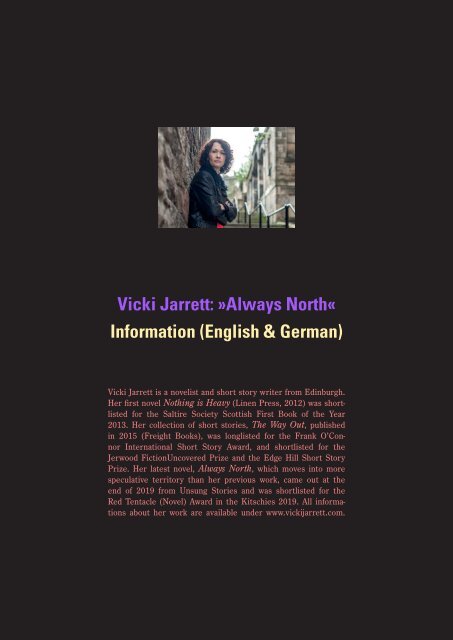



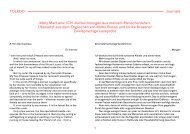
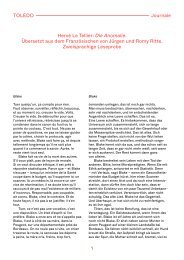
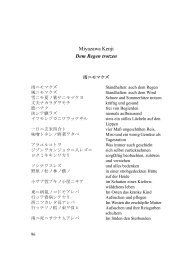
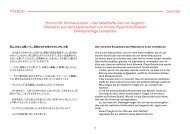
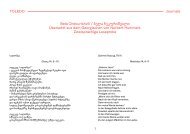
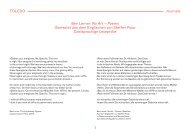

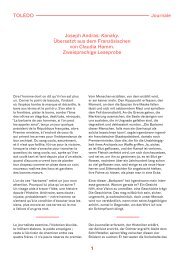
![[13] Perrone_Six Brazilian Songs_Bilíngue_DT](https://img.yumpu.com/65254747/1/184x260/13-perrone-six-brazilian-songs-bilingue-dt.jpg?quality=85)